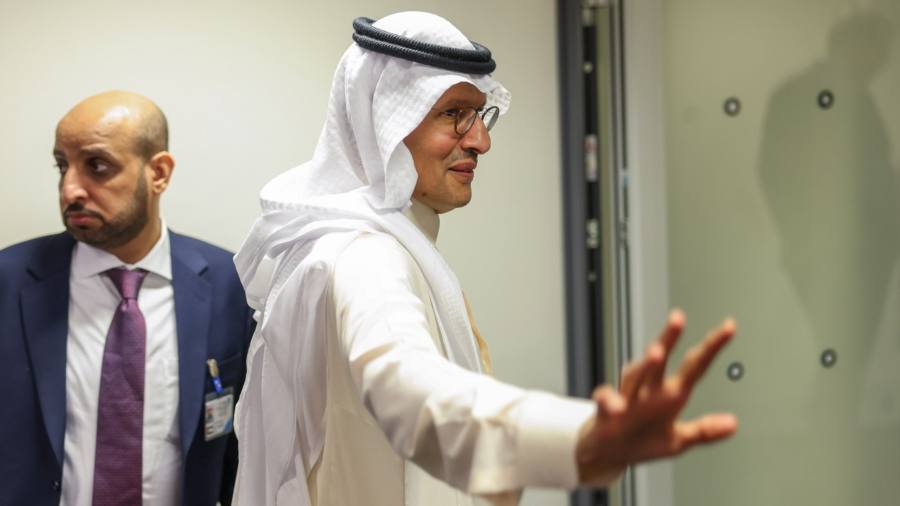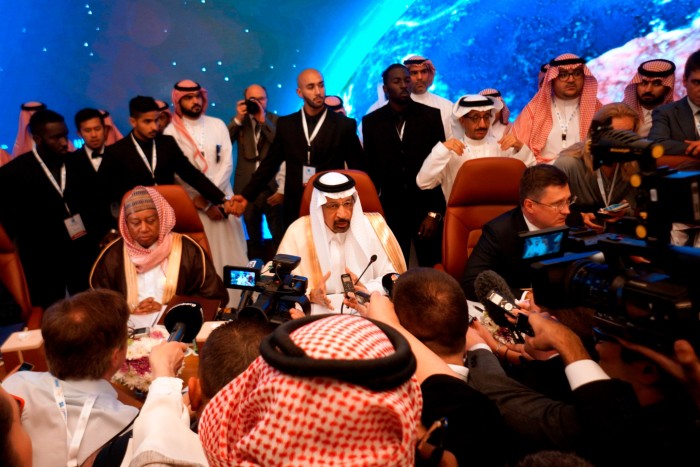
Opec has barred several media groups from attending its crucial production meeting in Vienna this weekend, in a move officials said was driven by Saudi Arabia as it struggles to support oil prices.
Reporters from Reuters, Bloomberg News and Dow Jones, the publisher of The Wall Street Journal, have been denied invites to Opec’s Vienna headquarters, according to people familiar with the matter. Opec is set to meet Russia on Sunday to agree on oil production policy for the second half of the year.
The media ban is unusual for Opec, with headlines from its meetings having the potential to move oil prices and financial markets around the world, particularly at a time when the global economy is wrestling with inflation.
No reason has been given for excluding the media groups. Opec, the Saudi Arabia energy ministry and the affected news groups either declined to comment or did not respond to requests for comment.
But people familiar with the decision said it had been instigated by Saudi Arabia’s energy minister, Prince Abdulaziz bin Salman — the half brother of Crown Prince Mohammed bin Salman — who has come under growing pressure to raise the price of crude, the kingdom’s economic lifeblood.
Prince Abdulaziz has led Opec and the wider Opec+ group, which includes Russia, in a series of production cuts since October, defying the White House by attempting to boost oil prices during an energy crisis triggered by Moscow’s full-scale invasion of Ukraine.
Newswires such as Reuters, Bloomberg and Dow Jones compete with the Financial Times and other publications to often try and break the result of the meeting before it has fully concluded, sending oil prices swinging on the result. The FT has received an invite as have a number of specialist trade publications.
The news organisations banned from the event are still expected to send reporters to Vienna, even if they cannot access the Opec secretariat.
Opec press coverage is famously chaotic in the industry, with ministers prone to delivering market-moving comments to reporters camped out in the lobby of luxury hotels ahead of the meeting.

On occasion, ministers are chased through the streets of Vienna by reporters if meetings break down in acrimony, without a formal statement on any agreement being made.
Opec and its allies in April announced a surprise production cut without calling a meeting, increasing the size of an output cut agreed at their last meeting in October.
But its efforts have only lent support to prices rather than boosting them. Brent crude is trading at about $73 a barrel — down about 10 per cent since the cuts were announced.
Many energy analysts believe that has increased pressure on Prince Abdulaziz, who in recent weeks has made a number of acidic comments targeting everyone from traders betting against the price of oil to the OECD-funded International Energy Agency.
Prince Abdulaziz, who once said oil traders would “be ouching like hell” if they bet against him, last week warned short sellers to “watch out” if they continued to bet against the oil price. The trade has grown in popularity amid doubts about the strength of the global economy.
One former energy trader, Adi Imsirovic, who once ran oil trading for Russia’s Gazprom, said Prince Abdulaziz appeared to have backed himself into a corner by indicating the group could cut again.
“He’s speaking without thinking through the consequences — if you make the market think you’re going to cut supply and you don’t, then prices will fall. But if Saudi Arabia cuts and Russia doesn’t then they will have to accept giving up more market share in Asia.”
Saudi Arabia requires a higher oil price to finance Crown Prince Mohammed’s ambitious social and economic reform programme, including a number of “gigaprojects”, such as the creation of the hypermodern Neom city on the Red Sea.